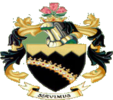Prince Albert Local Municipality
Prince Albert | |
|---|---|
 Seal | |
 Location in the Western Cape | |
| Coordinates: 33°00′S 22°00′E / 33.000°S 22.000°ECoordinates: 33°00′S 22°00′E / 33.000°S 22.000°E | |
| Country | South Africa |
| Province | Western Cape |
| District | Central Karoo |
| Seat | Prince Albert |
| Wards | 4 |
| Government | |
| • Type | Municipal council |
| • Mayor | Goliat Lottering |
| Area | |
| • Total | 8,153 km2 (3,148 sq mi) |
| Population (2011)[2] | |
| • Total | 13,136 |
| • Density | 1.6/km2 (4.2/sq mi) |
| Racial makeup (2011) | |
| • Black African | 2.8% |
| • Coloured | 84.5% |
| • Indian/Asian | 0.3% |
| • White | 11.8% |
| First languages (2011) | |
| • Afrikaans | 93.5% |
| • English | 3.6% |
| • Other | 2.9% |
| Time zone | UTC+2 (SAST) |
| Municipal code | WC052 |
Prince Albert Municipality is a municipality located in the Western Cape Province of South Africa.
History[]
At the end of the apartheid era, the area that is today the Prince Albert Local Municipality formed part of the Central Karoo Regional Services Council (RSC). The town of Prince Albert was governed by a municipal council elected by the white residents, while the coloured residents were governed by a management committee subordinate to the white council. Bitterwater (Leeu-Gamka) was also governed by a management committee subordinate to the RSC.
After the national elections of 1994 a process of local government transformation began, in which negotiations were held between the existing local authorities, political parties, and local community organisations. As a result of these negotiations, in January 1995 the municipality and management committee of Prince Albert were both dissolved and the Prince Albert Transitional Local Council (TLC) was created to replace them. In the same month the Bitterwater management committee was also replaced by the Leeu-Gamka TLC.
The TLCs were initially made up of members nominated by the various parties to the negotiations, until May 1996 when elections were held. At the time of these elections the Central Karoo District Council was established in place of the Central Karoo RSC, and transitional representative councils (TRCs) were elected to represent rural areas outside the TLCs on the District Council. The area that was to become Prince Albert Local Municipality was covered by the Prince Albert TRC.
At the local elections of December 2000 the TLCs and TRC were all dissolved and the Prince Albert Local Municipality was established as a single local authority. At the same election the Central Karoo District Council was dissolved and replaced by the Central Karoo District Municipality.
Politics[]
The municipal council consists of seven members elected by mixed-member proportional representation. Four councillors are elected by first-past-the-post voting in four wards, while the remaining three are chosen from party lists so that the total number of party representatives is proportional to the number of votes received. In the election of 18 May 2016 no party obtained a majority of seats; the Democratic Alliance (DA) won three seats, while the Karoo Gemeenskap Party (KGP) and the African National Congress won two each. The DA and the KGP formed a coalition to govern the municipality.[4]
The following table shows the results of the 2016 election.[5][6][7]
| Party | Votes | Seats | ||||||
|---|---|---|---|---|---|---|---|---|
| Ward | List | Total | % | Ward | List | Total | ||
| Democratic Alliance | 1,848 | 1,845 | 3,693 | 33.5% | 1 | 2 | 3 | |
| Karoo Gemeenskap Party | 1,759 | 1,823 | 3,582 | 32.5% | 2 | 0 | 2 | |
| ANC | 1,775 | 1,709 | 3,484 | 31.6% | 1 | 1 | 2 | |
| Independent Civic Organisation | 50 | 50 | 100 | 0.9% | 0 | 0 | 0 | |
| EFF | 37 | 45 | 82 | 0.7% | 0 | 0 | 0 | |
| Freedom Front Plus | 37 | 37 | 74 | 0.7% | 0 | 0 | 0 | |
| Total | 5,506 | 5,509 | 11,015 | 4 | 3 | 7 | ||
| Valid votes | 5,506 | 5,509 | 11,015 | 98.7% | ||||
| Spoilt votes | 73 | 73 | 146 | 1.3% | ||||
| Total votes cast | 5,579 | 5,582 | 11,161 | |||||
| Voter turnout | 5,582 | |||||||
| Registered voters | 7,386 | |||||||
| Turnout percentage | 75.6% | |||||||
The local council sends one representative to the council of the Central Karoo District Municipality. As of February 2017 that councillor is from the Karoo Gemeenskap Party.[4]
References[]
- ^ "Contact list: Executive Mayors". Government Communication & Information System. Archived from the original on 14 July 2010. Retrieved 22 February 2012.
- ^ Jump up to: a b "Statistics by place". Statistics South Africa. Retrieved 27 September 2015.
- ^ "Statistics by place". Statistics South Africa. Retrieved 27 September 2015.
- ^ Jump up to: a b "Political composition of councils February 2017" (PDF). Western Cape Department of Local Government. February 2017. Retrieved 4 June 2017.
- ^ "Results Summary – All Ballots: Prince Albert" (PDF). Electoral Commission. Retrieved 5 June 2017.
- ^ "Seat Calculation Detail: Prince Albert" (PDF). Electoral Commission. Retrieved 5 June 2017.
- ^ "Voter Turnout Report: Prince Albert" (PDF). Electoral Commission. Retrieved 5 June 2017.
External links[]
- Local municipalities of the Central Karoo District Municipality
- Karoo


